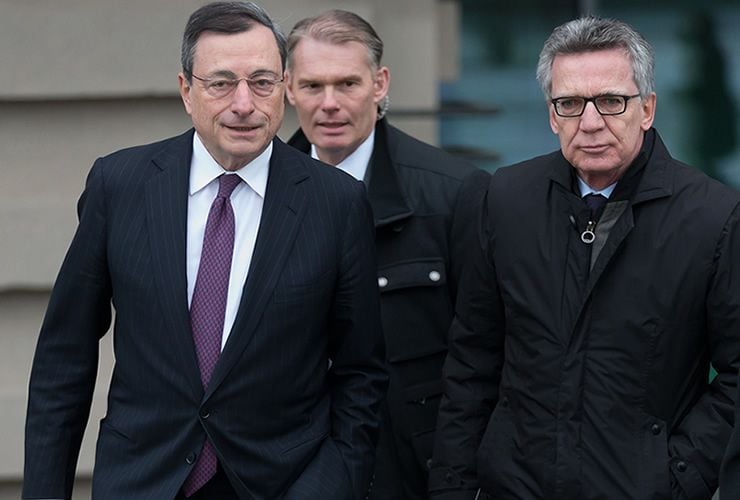GBP/EUR: the ECB is now Centre and Front

- Quotes:
- Pound to Euro exchange rate: 1.1779, this week's low: 1.1721, best: 1.1888
- Euro to Pound exchange rate: 0.8490, this week's low: 0.8450, best: 0.8531,
- Euro to Dollar exchange rate: 1.0879, this week's low: 1.0820, best: 1.0950
As we reported in the wake of the French election, the shift in focus for the Euro exchange rate complex would be away from politics to the European Central Bank.
And so it is.
Ahead of Thursday’s policy meeting the Euro is seen moving higher with traders betting that a shift in tone regarding future policy is likely at upcoming meetings.
The shift in expectations is clearly evident in the performance of the Euro which was one of the best-performers in the group-of-ten of the world’s largest currencies.
News reports have been particularly Euro-friendly today.
Three sources on and close to the bank's Governing Council told Reuters that with the threat of a run-off between two eurosceptic candidates in France averted, and with the economy on its best run in years, many rate-setters see scope for sending a small signal in June towards reducing monetary stimulus.
The change of tone in June is consistent with what a number of analysts have been telling us.
“The next milestone to watch for is a change in the central bank’s forward guidance. We expect this to come at the next policy meeting in June, where the ECB may remove reference to the possibility of ‘lower’ rates,” is the message from Gajan Mahadevan, a Quantitative Strategist at Lloyds Bank.
The Reuters report suggests some or all the references to prevailing downside risks to the outlook, to the possibility of further rate cuts or to larger asset purchases may be taken out.
Foreign exchange markets are clearly gearing up for a shift in tone and while May is not the meeting at which it is expected to happen one gets the sense that disappointment could well see the Euro fall.
Has the Euro Gone too High, too Fast?
The ECB will meet on Thursday and will likely keep the policy unchanged.
Yet, the market is calling for a more hawkish accompanying statement from President Mario Draghi.
"He is expected to give more details about the Quantitative Easing (QE) exit plans at the June meeting, six months earlier than previously anticipated," says Ipek Ozkardeskaya at London Capital Group. "In this respect, Draghi is expected to adopt his language at the communiqué as early as this week."
Ozkardeskaya warns that it is well possible that the markets have gone well head of themselves, given that we could also expect the ECB to be less emotional and more pragmatic and wait until the official result of the French election before moving into action.
We could therefore well see the ECB cap the Euro's advance.
The ECB have in the past worked hard at keeping expectations for a withdrawal of stimulus at bay in order to keep Eurozone bond yields and the Euro exchange rate complex on a leash.
If ECB President Mario Draghi is not happy with the latest rises in the currency he will surely let it be known on Thursday.
Indeed, analyst Shahab Jalinoos at Credit Suisse says that factors such as ECB quantitative easing and negative interest rates should continue to cap the EUR for some months yet, "especially as its own strength would raise the odds of the ECB delaying removal of ultra-easy monetary policy".
Analyst Jordan Rochester at Nomura expects the European Central Bank to signal its intention to taper its asset purchase programme at the September meeting with the move starting from January 2018.
So this would be a little later than the June meeting that many are anticipating. Nevertheless, the implications for the Euro's longer-term performance are good suggest Nomura.
“This would be EUR positive, and potentially in a non-linear fashion, as the ECB exits the ZLB,” says Rochester.
The ZLB is the Zero Lower Bound on interest rates. Saying "as the ECB raises interest rates" instead of "as the ECB exits the ZLB" could be a simpler way another way of putting it.
A key debate has been whether rate hikes can come before the end of the asset purchase programme.
“This scenario would be more EUR positive than the Fed-style normalisation process, which is one reason why this exit strategy may be problematic for the ECB,” says Rochester.
Nomura are forecasting the EUR/USD exchange rate to trade at 1.15 by the end of the year. "Positive fundamentals continue to underpin the EUR. The fundamental picture for the EUR is clearly for upside," says Rochester.
Such a move in EUR/USD will place notable upside pressure on EUR/GBP.





